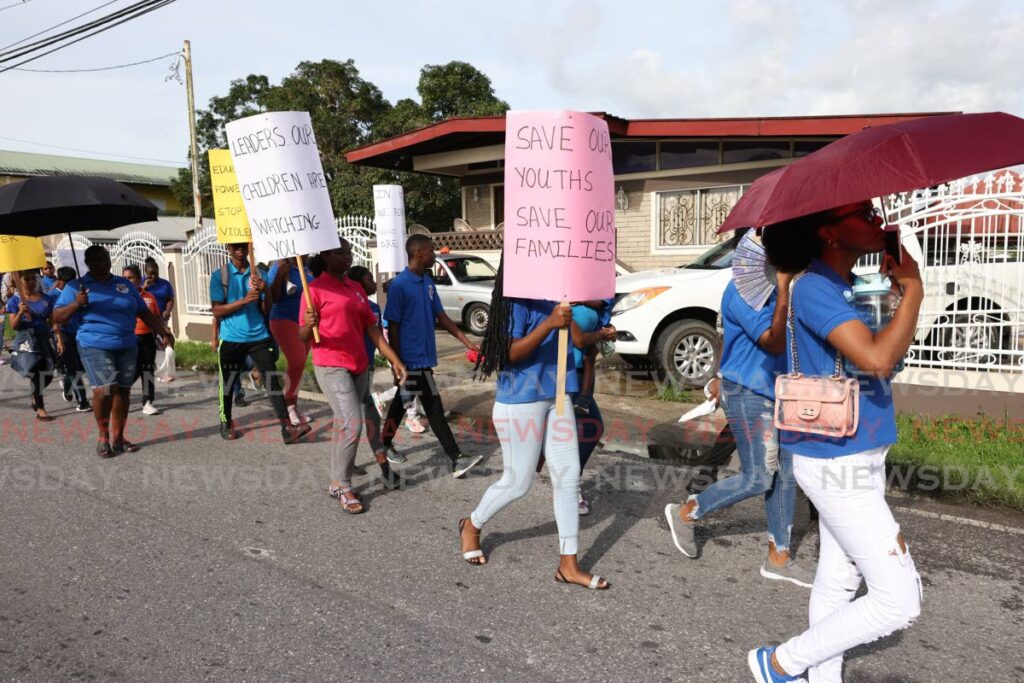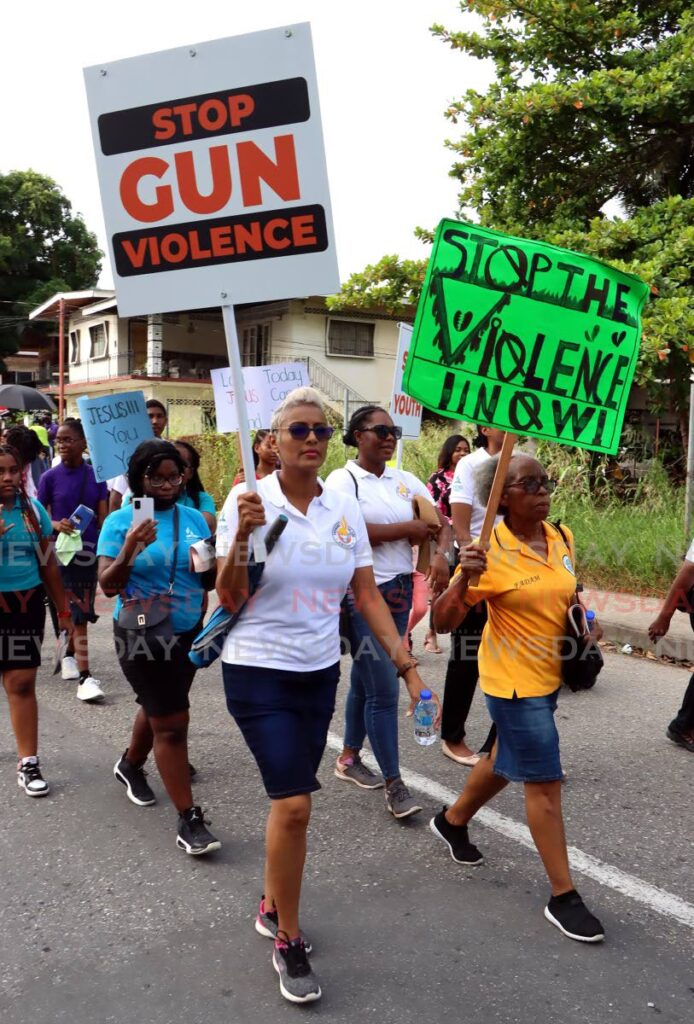CoP: Ankle bracelets for offenders, stronger laws can help curb crime

IN a bid to combat the escalating crime rate in TT, Commissioner of Police Erla Harewood-Christopher has announced that the police service is considering the use of ankle bracelets for individuals granted bail for firearm possession and violent crimes as a potential solution. However, it requires legislative backing, she said.
This comes as the public called on Harewood-Christopher to break her silence as the murder toll surpassed 300 last week, causing widespread concern. She assured TT the police will not fail.
The CoP's proposal aims to address the deficiencies in evidence availability and detection rates, as well as the need for innovative legislative interventions.
As of Saturday afternoon, the country had 314 murders for the year.
In a pre-recorded address sent to the media late Friday night, Harewood-Christopher revealed the police service is considering the use of monitoring devices, as a potential tool to address the issue of repeat offenders.
However, former commissioner of police Gary Griffith, TT Police Service Social and Welfare Association head Gideon Dickson and UNC MP Roodal Moonilal have mixed views on whether or not this plan can make a dent in the crime situation.
The CoP said, “This state of affairs warrants the consideration of innovative and unprecedented legislative interventions to deal with firearm possession and violent crime. The hardened modern criminal culture does not encourage offenders to come to their conscience, resulting in a situation where fewer confessions are coming out of investigations.
“This state of affairs warrants the consideration of innovative and unprecedented legislative interventions to deal with firearm possession and violent crime. Perhaps it is time to consider outfitting persons granted bail for firearm possession and violent crime with an electronic monitoring device to assist the police in treating with the problem of repeat offenders."
These devices would assist the police in tracking the movements of these individuals and curb their involvement in criminal activities.
As Harewood-Christopher acknowledged the concerns of the public, she highlighted the need for innovative solutions.
From January to June, TT recorded 286 murders, including 23 double and four triple homicides. While gang activity remains the greatest contributor to these crimes, followed by drugs, it was noted that more than 50 per cent of the murders occurred in the north-eastern, north central, north, and eastern divisions. Firearms continue to be the weapon of choice in these homicides, with a rate of 88 per cent for 2023, compared to 72 per cent in 2020.
“The population, various stakeholders, the media and the business community have all been watching with concern the daily murder toll that continues to move steadily upwards earlier this week. The murder toll reached 300 and our national consciousness was jolted as we reach this dreaded milestone. In a sense, we all share the collective disappointment that this is how violent our society has become.
Her address also comes following a spree of gun-involved murders, arson attack, and injuries of innocent commuters in the San Juan, Morvant and Barataria areas over the past week.
Many of this week’s murders were as a result of an ongoing feud between two incarcerated gang leaders, police confirmed.
Electronic monitoring system
The Ministry of National Security first introduced electronic monitoring devices in 2021. While providing an update on the use of the devices, in 2022, Minister Fitzgerald Hinds said, up to that time, the court had imposed electronic monitoring bracelets on some 38 individuals.
However, he could not give the total number of bracelets available. Contacted on Saturday, Hinds told Sunday Newsday the commissioner would be the best person to say how many monitoring device TT currently has.
According to the ministry’s website, it’s Electronic Monitoring System, which manages and monitors the bracelets, is intended to introduce a new sentencing option to the court as an alternative to incarceration, and as a condition of bail for certain charges, including domestic violence and sexual offences.
TT behind on crime-fighting tactics
Commenting on the commissioner’s address, Moonilal said the TTPS has been behind – globally and regionally – on taking advantage of technology to combat crime. He told Sunday Newsday, “The Government continues to fuel crime by giving multi-million-dollar contracts to known gangsters, to denying the police service optimal resources, and by keeping the country's borders porous.
“Most CCTV cameras are still not operational. The cancellation of community policing has robbed the society of an important safety measure and a source of intelligence gathering. The police service is still being denied the use of state-of-the art technology. The Government must also provide the required resources to the judiciary to speed up the delivery of justice.”
He further accused the government of openly undermining important independent institutions.
Griffith – now political leader of the National Transformation Alliance – described the address as “a well prepared drafted message to do damage control after refusing to address the media previously.”

He told Sunday Newsday, “All that was said is a repeat of the four-pronged points of the challenges and constraints, the recent success achieved, crime statistics and the need for the citizens to assist. All necessary information for the public but what is required and was being asked for is what new is being planned as the present policies are simply not working.”
He reiterated that various policies, projects and units he established during his tenure as commissioner, were dismantled or shut down.
“If everything that worked was removed, then the public wants to know what is new that will turn this around as you can't keep doing the same thing and expect different results.”
Dickson welcomed use of monitoring in this way.
He said, “Any other layer to fight crime will go a long way. We just need the judicial will. I encourage that strategy. Data would show that most times the people involved in these activities are persons who are repeat offenders. They go through one door in the justice system and come through the next.
Unlike Moonilal, Dickson said it’s never too late to take another direction in the battle against crime.
“From where we are, we cannot be doing things the same way and expecting different results. Whether it was introduced three months ago, or at this time it is another layer of crime-fighting initiative which has been proven in other jurisdictions, that has worked. We just need the necessary resources to ensure the proper monitoring is done and for our judicial system to see it as a way to protect the people. Everybody has a part to play.”
Our strategies are working
The CoP acknowledged the challenges faced by law enforcement in tackling crime, including the instability within gang networks, rivalries among gang members, and the sharing of criminal knowledge among repeat offenders.
But she stressed the importance of staying one step ahead of criminals by deploying advanced technologies and implementing intelligence-led precision policing strategies.
Many of these strategies have been implemented in this year’s crime plan.
She said the successes achieved by the TTPS in various areas, include increased police visibility, direct patrols, and precision-guided stop and search operations. These initiatives have resulted in a rise in seizures of illegal firearms and a reduction in woundings, shootings, and other serious crimes.
These crime initiatives resulted in the seizure of 375 illegal firearms compared to 356 for the corresponding period last year –2022.
She said 9,264 rounds of assorted ammunition, 427 kilogrammes of marijuana, 178 kilogrammes of cocaine, including one of the biggest cocaine seizures with a street value of $234 million were major milestones for the service.
Additionally, 625 people were arrested for possession of firearm and ammunition, 651 suspects were detained for larceny and robbery offences and 476 suspects were arrested for other serious crimes for the same period.
“As commissioner I appreciate that, despite the successes of the TTPS in other areas of policy. It is the murder toll that most concerns the citizenry and causes their greatest anxiety and grief. And it is for this reason that it carries the most weight on my scorecard and that of every police officer. Crime is dynamic and that requires us to be always one step ahead in our strategies, and in the deployment of available technologies.”
Despite the challenges, she praised officers for the significant progress made in tackling crime. Measures such as intelligence-led precision policing, heightened police visibility, and direct patrols have resulted in overall reductions in woundings, shootings, and other serious crimes.
Come forward with information
In the coming months, she said police will continue to implement proactive strategies, leverage advanced technologies, and work closely with communities to ensure a safer and more secure nation.
She, once again, pleaded to anyone with information on crime to come forward. “The availability of evidence to drive investigations to the stage of arrest is seriously deficient and affecting the detection rate. Witnesses are free to come forward and provide the required information. Despite the increased capacity of technological and scientific evidence, the unavailability of the human contacts severely constrains the work of investigators.”
Noting the public’s and media’s calls for regular comments, Harewood-Christopher said the police's activities must take precedence in ensuring the security the country.
“I stand resolutely with the over 10,000 men and women who I lead to confirm the challenges of the future to ensure a safer and more secure TT. We will persist in our work to get the results we desire the results that the country is demanding of us. We will not relent and we will not fail."

Comments
"CoP: Ankle bracelets for offenders, stronger laws can help curb crime"